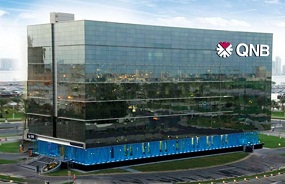
Nigeria’s economy presents major opportunities for foreign investors. A July 2014 McKinsey report projected that GDP could triple to USD1.6trn by 2030, supported by rapid infrastructure expansion through investment of up to USD1.5trn.
As the largest and most populous economy in Sub-Saharan Africa (SSA), it has grown rapidly since 2010 on a continued expansion of its manufacturing and services sector. Real GDP growth accelerated to 6.54% in Q2 2014, compared with 6.21% the previous quarter. Looking ahead, we expect the economy to continue in the 6%-7% range, making it one of the fastest economies in the region, a QNB press release said.
Nigerian GDP was rebased in April 2014, doubling it overnight from USD273bn to USD523bn and thus making it the largest economy in Africa, surpassing Egypt and South Africa (22nd largest in the world).
The economic fundamentals suggest that the potential for growth is high. The population is large (169m) and expanding quickly (2.7% per year).
McKinsey expects 70m people to move out of poverty by 2030. Real GDP growth is rapid at 6.2% from 2010-13 (CAGR), which has helped lift GDP per capita from USD2,347 to USD3,087 over the same period.
Although the primary sector (mainly agriculture as well as the petroleum sector), services sectors have driven growth in 2010-13, all expanding by over 7% with the exception of government services.
The rebasing of GDP increased the value of the service sectors by 3.4 times and it now accounts for 45.7% of GDP. Private consumption now accounts for 71.7% of GDP. The fast-growing population and rising wealth underpins this growth in services sectors.
Of particular note is the financial services sector, which grew at a CAGR of 18.6% in 2010-13 as it recovered rapidly from the global financial crisis when non-performing loans rose sharply.
Nigeria has achieved this remarkable growth rate despite considerable handicaps. The country’s infrastructure is dilapidated. Power infrastructure is most in need of investment the electricity output of the entire grid in Nigeria is equivalent to the output in Qatar, notwithstanding the large difference in population. Blackouts are common and 18% of Nigerians have no power.
Furthermore, the business environment is challenging. Nigeria ranks 147 out of 189 countries in the World Bank’s Doing Business report (185th for “Getting Electricity”) and 127th out of 144 countries in the WEF’s Global Competitiveness Index (134th for infrastructure).
Despite these challenges, the strong fundamentals of the Nigerian economy mean that it remains an attractive destination for international investors. There are also investment opportunities in developing much-needed infrastructure. A National Integrated Infrastructure Master Plan (NIIMP) was approved in 2012, covering the period 2014-43.
It is expected to involve USD3.1tn of investments over the 30-year period backed by sovereign wealth and revenue from the oil and gas sector. An initial phase under the plan, involving USD1.1 billion of public expenditure in power, transport (roads, railway, ports and airports), oil and gas, housing, water and communications was announced in September 2014. The government expects the private sector to match public investments.
The energy sector offers the largest opportunity for international investors. The government launched an ambitious power privatization program in 2013 that aims to invest USD8bn in the sector (separately from the NIIMP) to expand electricity generation and distribution as well as boost gas production.
In 2013, the dominant state-owned operator was broken up into six generating companies and eleven distribution companies. Furthermore, the government is now selling majority stakes in 10 government-owned gas-fired power stations, which could double power generation.
This will increase domestic demand for gas in Nigeria and is likely to lead to more investment in gas exploration and production, which has been relatively neglected until now.
Even at its current high rate of growth, Nigeria presents a considerable opportunity for foreign investors. If it can overcome its challenges in infrastructure and improve the business environment, there is considerable potential for even higher growth, particularly in consumer goods and services sectors.
Source : Qatar News Agency












